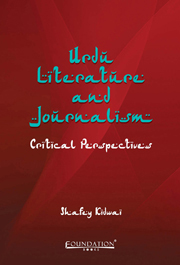Book contents
- Frontmatter
- Dedication
- Contents
- Preface
- Introduction
- Acknowledgements
- 1 Post-Independence Urdu Short Story
- 2 Post-Partition Urdu Poetry
- 3 Structuralism and Post-structuralism in Urdu Criticism
- 4 Jayant Parmar
- 5 Firaq as a Critic
- 6 Ghalib Criticism
- 7 Literature, Culture and Social Consciousness
- 8 The Influence of Tagore on Urdu Literature
- 9 Early Journalistic Endeavours of Sir Syed Ahmad Khan
- 10 Pioneering the First Urdu Book on Journalism
- 11 The Contribution of Urdu Journalists to the First War of Independence
- 12 Abul Kalam Azad's Journalistic Conquests
- Index
Introduction
Published online by Cambridge University Press: 05 October 2014
- Frontmatter
- Dedication
- Contents
- Preface
- Introduction
- Acknowledgements
- 1 Post-Independence Urdu Short Story
- 2 Post-Partition Urdu Poetry
- 3 Structuralism and Post-structuralism in Urdu Criticism
- 4 Jayant Parmar
- 5 Firaq as a Critic
- 6 Ghalib Criticism
- 7 Literature, Culture and Social Consciousness
- 8 The Influence of Tagore on Urdu Literature
- 9 Early Journalistic Endeavours of Sir Syed Ahmad Khan
- 10 Pioneering the First Urdu Book on Journalism
- 11 The Contribution of Urdu Journalists to the First War of Independence
- 12 Abul Kalam Azad's Journalistic Conquests
- Index
Summary
Scarcely does a language endure as much agony in its own homeland as Urdu, and that too in the hands of those who describe it as the controlling metaphor of their distinct cultural identity as the majority of its native speakers, mostly living in north India, no longer use it as a means of communication, and the new generation is hardly even aware of its script. Still bearing the brunt of the Partition, Urdu finds it extremely difficult to preserve its script due to a continual fall in its use. However, notwithstanding the apparent decline, the language is still spoken by more than 60 million people (2001 census) in India and the literature in Urdu by distinguished poets and fiction writers like Meer, Ghalib, Iqbal, Premchand, Manto, Bedi, Firaq, Faiz, Nasir Kazmi, Ahmad Faraz, Intizar Hussain, and Shaheryar draws immense adulation from all quarters.
Urdu has won a fair share of admirers for its ingrained quality of bringing different cultural sensibilities together as well as detractors for allegedly championing the cause of the Partition. In this backdrop, one has to study Urdu literature, and the articles included in this book are braced for understanding the dynamics of the power of cultural paradox that is evidently manifested in the case of Urdu. What kind of cultural and ethnic identity is being fostered by Urdu literature? Who are the prominent authors of the post-Partition Urdu literature? These questions are delineated in these articles that revolve around Urdu writers in India. This book, an assortment of twelve essays, is an attempt to analyze Urdu's inherent prowess of strengthening liberal values, pluralism and ingesting new literary trends, ideological positions and current socio-political discourses.
- Type
- Chapter
- Information
- Urdu Literature and JournalismCritical Perspectives, pp. x - xvPublisher: Foundation BooksPrint publication year: 2014

